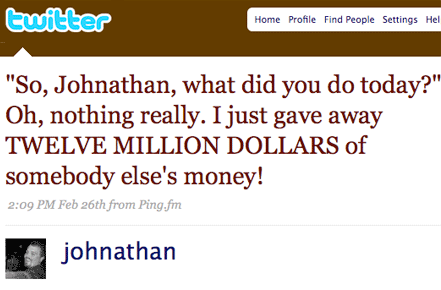Juror Tweet: "I just gave away TWELVE MILLION DOLLARS of somebody else's money"

 Twittering from the jury he was serving on as it was awarding a massive settlement against a building materials company by Jonathon Powell of Fayetteville Arkansas has resulted in defense motions for a mistrial.
Twittering from the jury he was serving on as it was awarding a massive settlement against a building materials company by Jonathon Powell of Fayetteville Arkansas has resulted in defense motions for a mistrial.
Powell "was predisposed toward giving a verdict that would impress his audience." by using his mobile phone to give a running commentary on proceedings, said defense attorney Drew Ledbetter.
The jury awarded the money on Feb. 26 to Mark Deihl and William Nystrom, two investors in Stoam, which claims to combine the insulation qualities of foam with the strength of steel.
According to the mistrial motion, one tweet listed the company's Web address and read: "oh and nobody buy Stoam. Its bad mojo and they'll probably cease to Exist, now that their wallet is 12m lighter."
Greg Brown, Deihl's attorney, called the venture "nothing more than a Ponzi scheme."
AP: Brown said he doubts a new trial will be granted. He said Arkansas law requires defendants to prove that outside information entered the jury room and corrupted a verdict — not that information from the jury room made its way out.
Powell, a 29-year-old manager at a Wal-Mart photo lab, said he tried to talk to the judge Friday about what happened, but was turned away. He seemed a little shocked at what kind of power the 140-character messages on Twitter can carry.
The 'Stoam' inventor's appeal against the $12.6US verdict is essentially relying on the classic problem for those struggling to keep enterprises secure: new ways of collaborating and communicating allow information to leak out in highly sensitive situations.
Legal Discovery For every person who rejoices in the idea that information wants to be free, there's another one smarting from losing valuable intellectual property. Just look at the music industry.
Despite the wildfire adoption rate of Twitter there are very few usage models maturing for what is essentially a freestyle communication device. This indiscrete use of the communication medium in a controlled environment could result in an expensive retrial - and if it doesn't happen this time it soon will somewhere else.
While it seems trivial for those championing Twitter as a free and easy online community, the vast international legal discovery industry who charge for the costly retrieval of archived e-mail during legal discovery in an increasingly regulated business environment would see this very differently.
Preservation of e-mail evidence is crucial to avoid the costs of spoliation motions.
Twitter is currently a wild west of unregulated, off the cuff comments, some of which which can vault people to fame or wreck their careers. Most people wouldn't dream of taking their laptop onto a jury and sending emails - and the judge would probably ask what you thought you were doing - but Twitter and other micro blogging services are too new to appear on the radar, until they become part of a legal issue.
The reality in the enterprise is that despite glued up USB ports on company laptops and bans on IM clients, increasingly employees have computers in their pockets that can circumvent the fortress walls. The challenge for the legal discovery profession going forward will be not just fishing out incriminating tweets from the net, but more proactively providing guidance on what can and can't be communicated.
The business model for Twitter may be written by lawyers....